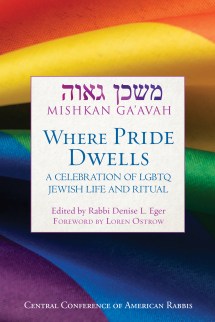
In this excerpt from The Social Justice Torah Commentary, Rabbi Mary L. Zamore, Executive Director of the Women’s Rabbinic Network, draws on Parashat Vayikra to call for holding Jewish leaders accountable.
Yes, it is awful that he said those things. They are totally inappropriate, but he is a beloved member of our clergy team, a founder of our congregation. We must recognize that he only yells at our professional staff and lay leaders when he is stressed.
She just has trouble with boundaries, but she’s harmless. If we hold her accountable, she may leave the temple, which would be devastating. After all, she donates hours and hours to our synagogue. She is irreplaceable. The staff just needs to avoid her. We will remind her not to go to the staff members’ homes without permission.
We all know his behavior is not right, so we will make sure he does not meet with women alone. He’s going to retire soon. There is no reason to ruin his otherwise stellar reputation. Retirement is just a few years away. Maybe we can encourage him to leave sooner.
He has suffered enough by his sexual harassment coming to light. However, his contributions to the Jewish community are far too numerous not to quote him. Whom else could we cite? And why mention this dark spot on an otherwise sterling career?
Above is a compilation of remarks reflecting many real cases in the Jewish community, conflated here to illustrate a theme. The common thread is a lack of accountability for the productive perpetrator. This is the professional or lay leader in a congregation or institution who is successful in their work, yet has substantiated accusations of sexual assault, harassment, or abusive/bullying behavior against them. They are trusted and beloved, generous with their time and/or money; they excel in their field. And because of their success, their community will never hold them accountable for their bad behavior—even though it endangers the community’s atmosphere of safety and respect—leaving a wake of damage in their path. Often working to keep the behavior and its negative impact unknown to the wider world, community leaders act as if the bad behavior is an unavoidable tax for the benefits the community reaps from the productive perpetrator’s presence and work. However, Parashat Vayikra teaches us the exact opposite, commanding us to hold our leaders accountable to a higher standard.
Vayikra outlines the rituals for different types of sacrifices: olah (עֹלָה), burnt offerings; minchah (מִנְחָה), meal offerings; sh’lamin (שְׁלָמִים), well-being offerings; chatat (חַטָּאת), purgation offerings; and asham (אָשָׁם), reparation offerings. While on the surface this portion reads like a simple instruction book for the sacrifices, it is infused with foundational values. Holding our leaders accountable for their actions is intrinsic to the biblical design of the ancient sacrificial cult and the accompanying priesthood, as we can observe in the parashah’s commandments.
The Israelite sacrificial cult is designed to function in an atmosphere of radical transparency. After the engaging narratives of Genesis and Exodus, it is easy to overlook the revolutionary nature of Leviticus. The laws regulating the sacrifices were given to the entire people of Israel, not just to the elite class of priests. There were no esoteric, secret rituals known only to the kohanim, the priestly class. Furthermore, sacrifices were performed publicly. As The Torah: A Women’s Torah Commentary explains, “Although Leviticus preserves the priests’ privileged monopoly regarding the service at the altar and its sacrifices, these instructions demystify the priests’ role by making knowledge about their activities known to every Israelite.”1 Coupled with the prohibition against land ownership by priests (Numbers 18:20), universal access to the law equalized power in the Israelite community. Kohanim were supposed to facilitate the community’s efforts to draw near to God rather than amass power for themselves.
The public viewing of offerings also created accountability. The Hebrew term eidah, “community,” is related to eid,“witness.”2 If a priest inadvertently made a mistake or knowingly deviated from the prescribed rites, the Israelites would know because they could witness the offerings in real time. The elevated status of the kohanim in the community required that they be held to a high standard. Parashat Vayikra demands a rigorous method of atonement for the priests’ misdeeds, whether they were known to the public (Leviticus 4:3) or not (Leviticus 4:13). It should be noted that the Torah also holds chieftains to a standard higher than that of ordinary Israelites (Leviticus 4:22), but not as high as the priests. This portion clearly teaches that the greater one’s status is in the community, the more accountable they must be for their actions.
The full chapter can be found in The Social Justice Torah Commentary, which delves deeply into each week’s parashah to address pressing contemporary issues such as racism, climate change, immigration, disability, and many more.
1. The Torah: A Women’s Commentary, ed. Tamara Cohn Eskenazi and Andrea Weiss (New York: Reform Judaism Publishing, an imprint of CCAR Press, and Women of Reform Judaism, 2007), 571.
2. The Torah: A Women’s Commentary, 580.
Rabbi Mary L. Zamore is Executive Director of the Women’s Rabbinic Network. She is the editor of The Sacred Table: Creating a Jewish Food Ethic and The Sacred Exchange: Creating a Jewish Money Ethic, both published by CCAR Press.















